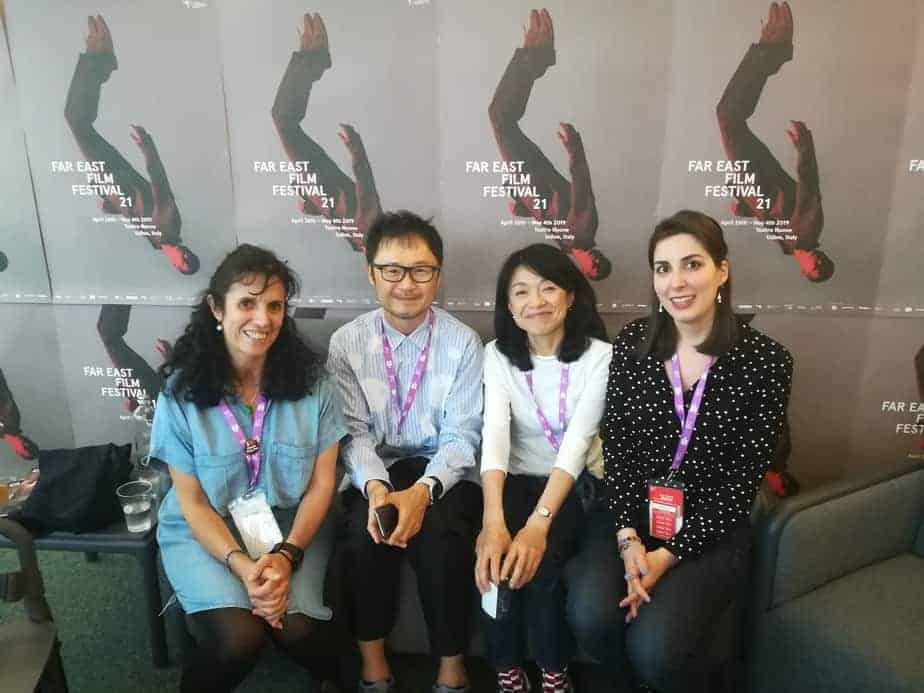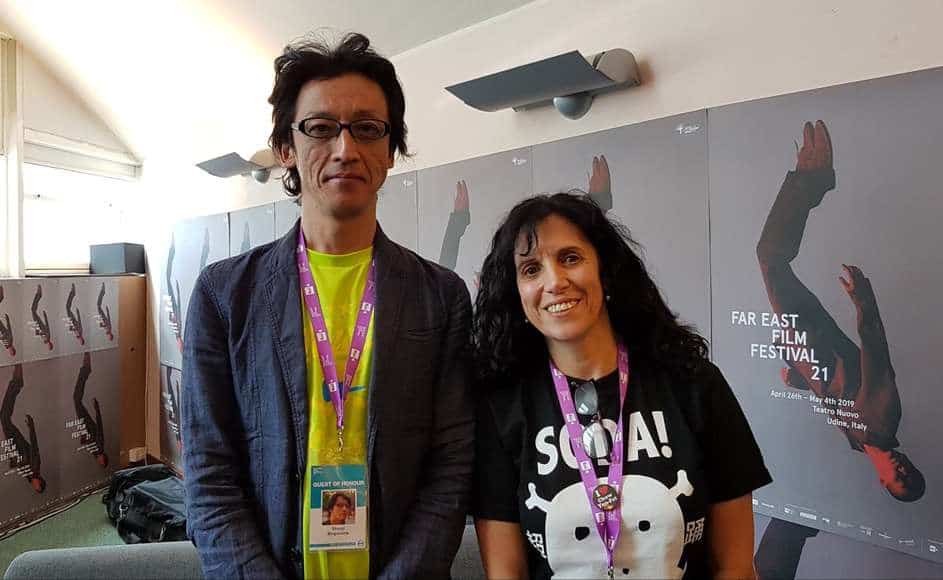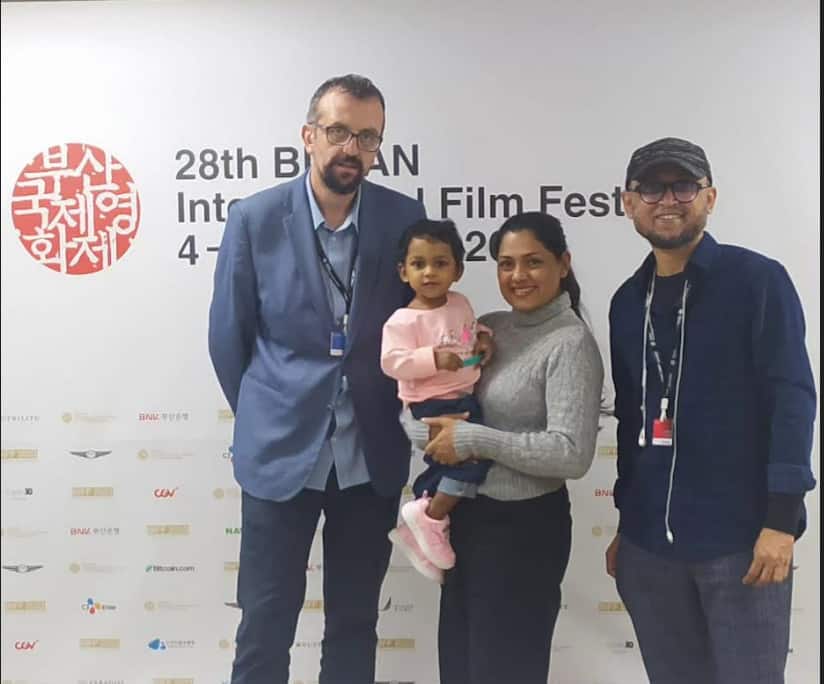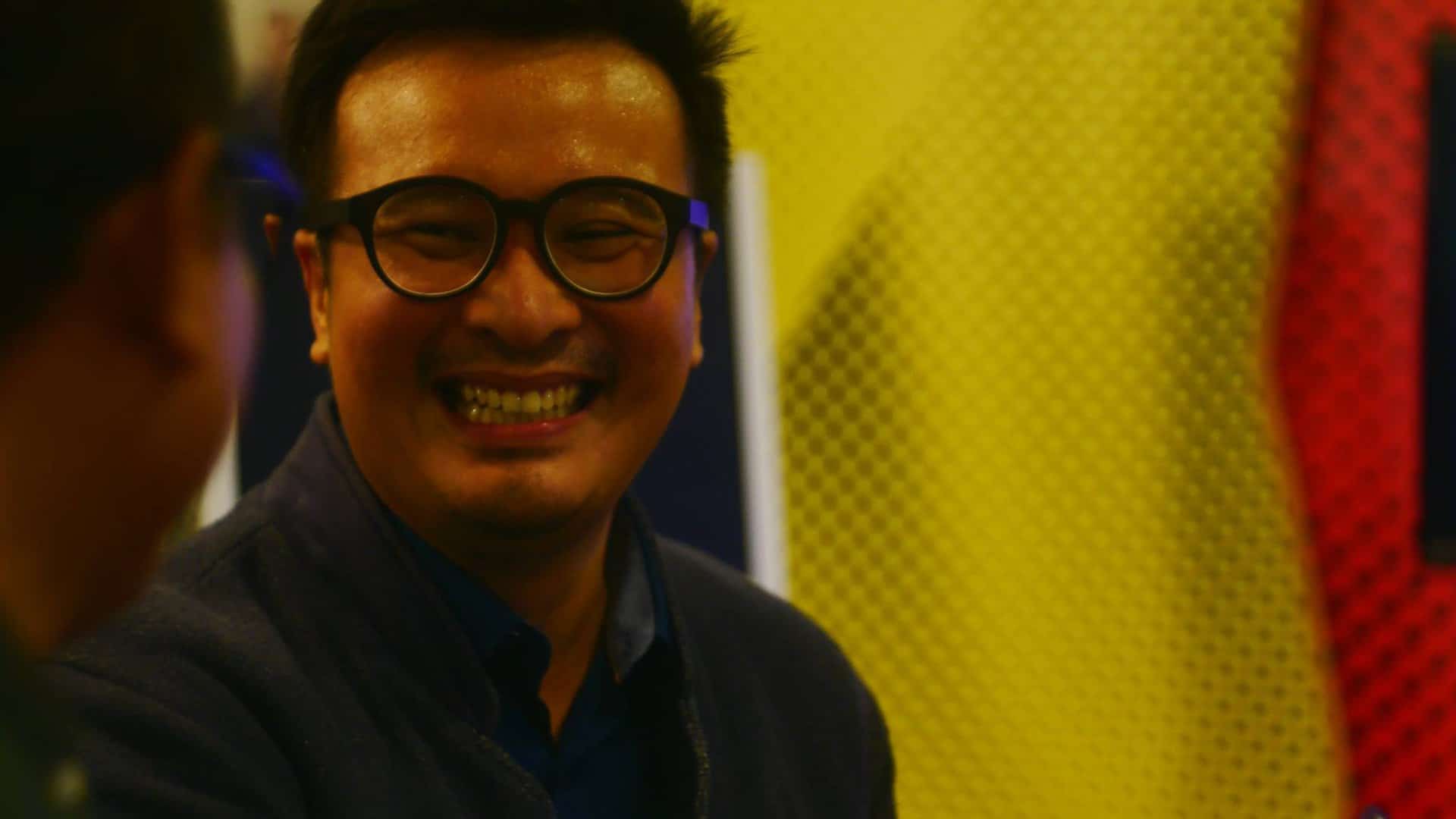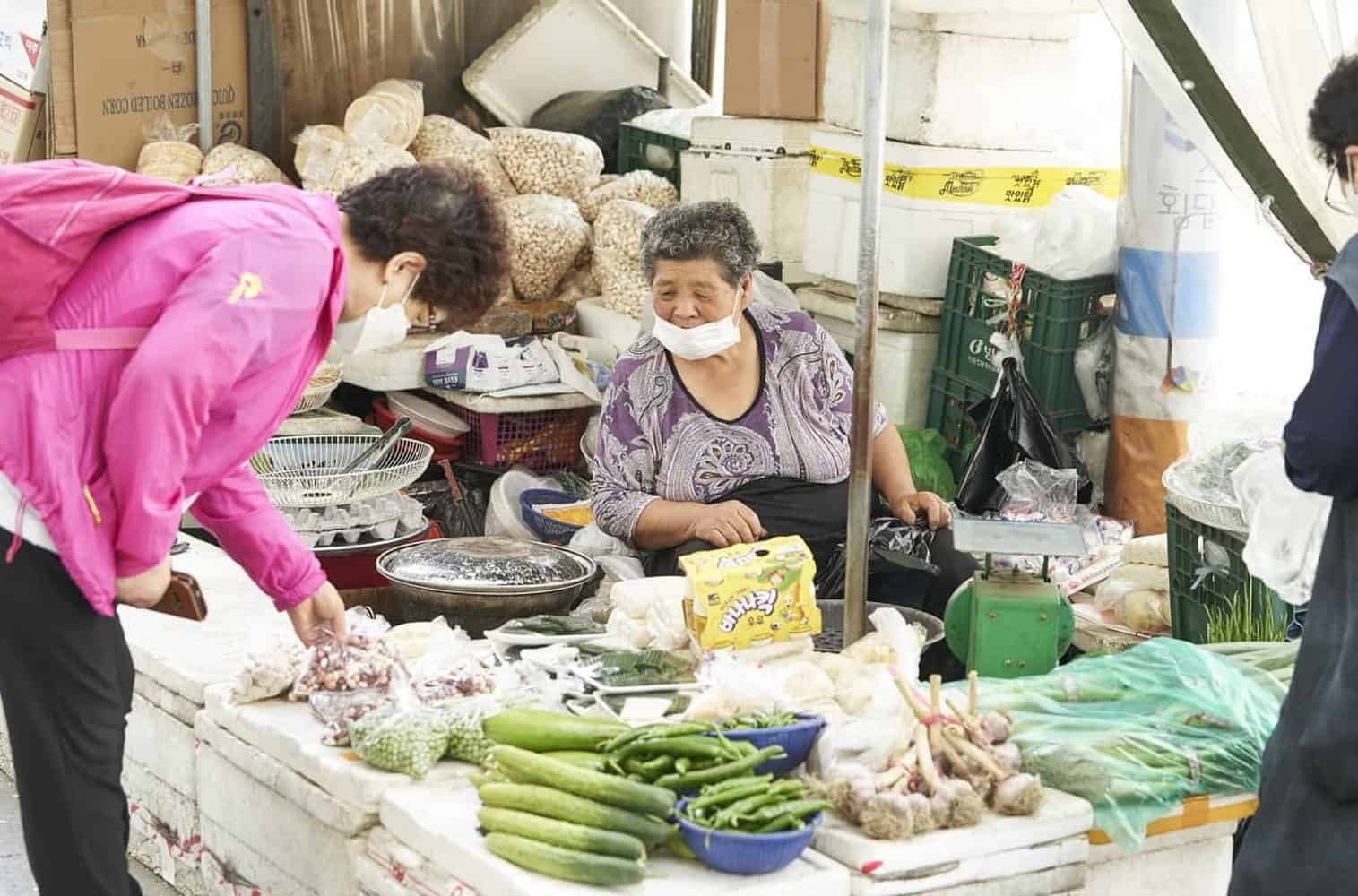Interview by Adriana Rosati and Oriana Virone
After “Kampai! For the Love of Sake” in 2015, Konishi Mirai comes back with a second documentary on sake: “Kampai! Sake Sisters”. The director came accompanied with Master Brewer (or toji) Imada Miho, one of the main protagonists, to present the movie in Udine.
On the occasion of their film “Kampai! Sake Sisters” screening at Udine Far East Film Festival we speak about a wave of change in the Sake world, a new food-pairing trend and the power of movies.

What got you into sake and what made you want to expand on the topic?
Konishi Mirai: I have to say that before the first movie, I didn't have that much experience in Japanese sake, but I realized that it was a rather interesting environment. Because of this, at the time of the first documentary, I got acquainted with three people in the sake business. At the time, I was already interviewing them and shooting with them and I realized that this particular business was extremely interesting. They were all so interesting that I thought, at this time – when I was shooting the first movie- I thought it would be great if I had the chance to shoot a second one, a sequel. In fact, I wanted to add more; as I was following the characters, I met other interesting people. I wanted to include so much more but it would have been a five-hours movie, and I had to restrain myself. So while shooting, I was thinking of having hopefully the chance to make a sequel. But at the time, I had no idea how to do it or about the theme. I knew it had to be about three professionals but the idea of focusing on female professionals came much later.
When did you feel that there was a wave of change in this industry? Did you already feel it while shooting the movie?
Konishi Mirai: As I said, during the first movie, I didn't have much knowledge yet about Japanese sake. I had that image that it was a business where women were not allowed, there is this very old approach. But while I was doing the shooting, I happened to bump into people like Mrs Imada, that are not just working-women in that business, but they are tojis, they are master brewers and they are at the top of the business. And I was shocked by this, because it was completely different from the image I had in the past. I realized that they were not just a few females, but they might be a number of female characters and therefore I thought it would be interesting to have a feature film about these characters.
Imada Miho: I would say that I perceived much of these waves of change about 10 years ago. I remember we would have some sake tasting and I remember, about 10 years ago, the female customers were increasing in number. At the same time, that was about the same time female customers were drinking in order to enjoy sake.
Konishi Mirai: Perhaps it also has to do with something changing in terms of working women within this business
Imada Miho: Yes, there are so many different aspects that we have to take into consideration. We have to think that now the type of sake that is being brewed is different from the past. Once, sake was not made to be enjoyed, it was just made to get drunk. There is also the old way Japan used to think of sake, because Japan used to be a poor country, at the time. But now it is different, now it's no longer a product that you have to get drunk, it is a product that you enjoy with something good, also because our lifestyle has become healthier. So perhaps I would say that when women got into society, being able to work, that was the moment when we got a real wave of change, because it's then they decided they wanted to have sake in order to have an enjoyable moment. And I would say that was about 10 years ago.

You said you wanted to focus on three characters, how did you decide who you wanted to have in your movie?
Konishi Mirai: When I was making the first documentary, I picked three people. I wanted them to be in different positions from the sake production, advertisement and distribution. Actually, I was thinking of that movie “Traffic”. The movie is about the drug trafficking. It shows the grower, the trafficker and the consumer. I know it's a totally different kind of movie, but those were my ideas. My first documentary had the brewer, and then the educator, and then the president doing the promotion and distribution. By doing that I was hoping to show all the different sides of sake and to define characters. I liked that idea.
For the second documentary, I thought that what was missing was the customer-business, restaurant business side. And that is where the females are really thriving. The first character I chose was Marie-san, who works at the sake bar. Then I got to meet Rebecca. She is also on the promotion side. They both have close relationships with all the brewers, so by featuring them, my hope was to feature as many brewers as possible. The last piece was the brewer. There are about 1300 brewers, and only 30 female toji. I needed to pick one of them. And it was a tough choice. If you ask anyone in the industry, they all recommend Imada-san. But I was hesitant. And only because my documentary is not about the sake itself, it's about the human story behind and would she speak about her past? I didn't know anything about her. I knew about what kind of sake she makes, and that she is a respected toji, but I had no info about her background. I was scared. But we have a mutual acquaintance who happened to know about her past. And that was the moment I decided to ask her to be in the movie.
There is another element I wanted to feature this time. I realized that sake is not that interesting to watch. It's clear and it's not colorful at all. The audience cannot taste, cannot smell. Which is why I wanted to show the food-pairing. That was one of the reasons I wanted to feature the bar owner and the sake consultant. Because it gave me many occasions to feature the food, with the pairings. And make it colorful and tastier. So that was another reason for me to choose these three people.

Mrs Imada, what made you decide to agree to work with Konishi Mirai?
Imada Miho: My hometown is the place where, for the first time, soft water was used in order to make sake. Also, the tradition comes from the father- tojis, the masters brewers. And when I got the proposal from Mr Konishi, I wanted to have this on record. I wanted to record all of this.
Konishi Mirai: The generation of the tojis decreases every year. In Akitsu, the hometown of Mrs Imada, the other master brewers are just three. The population is really decreasing.
Imada Miho: I also had the chance to see the documentary, both in Japan and in Udine. I realized how strong and wonderful the power of movies is.
All the three main character's pasts are explored in the movie. Do you think they have something in common that helped them develop this passion and those skills for sake?
Konishi Mirai: The common thing they all have is that they all grew up in nature. They were exposed to the beauty of nature and maybe it helped them to develop their pallet. That is a very strong common point. The other thing is that in their adolescence, they all had to face some hardship. Mrs Imada had trouble in high-school, Marie and Rebecca both had to move around, they were always the new girl in town. I don't know if that fact has any influence to their career, but it is something they have in common.
Actually, when I was making this documentary, I didn't have any script, I was just focusing on each person and I had no idea how to connect them together. When I first edited the film together, that teenage period that didn't go smoothly, that was the moment I thought that it could be a movie.
How did you work on the documentary, did you use any script?
Konishi Mirai: As a journalist, I sometimes show up on Japanese TV shows, and it is fully scripted and I was not comfortable with that. They prepare every answer I am going to answer. They have to do it, because they have to bring the guests on the same day, they have no time to play with the interviews. But once I decided to make a feature film, I didn't have any deadlines. I also didn't want to use a script because of my experience as a journalist. As a journalist, you have to prepare the questions but once you realize it's not working, you have to go with the guts, right? It's kind of taking a risk, but usually it gives better results. I wanted to try the same method with the feature. That is why the movie is not scripted, which gave me a bit of trouble with the editing but I think it worked out okay and it made sense.

Are you familiar with the wine culture and did you get a chance to meet anyone? The Friuli-Venezia Giulia region is famous for its wine and they are a lot of female wine producers here.
Imada Miho: I am very interested in wine, but I am not very knowledgeable about it at the moment. In practical terms, because I had the chance to come here, I thought that I would like to understand more about Italian wine. I would also like to study wine more because I think that, as a Japanese person who is making sake, having the possibility to study more about this could be something that would also help my own knowledge.
Konishi Mirai: I would like to show you something, this was shot today. He shows us pictures of wine degustation and vineyard. After this I went to this other place. I had ten samples before coming here so I hope my answers make sense (laugh). But I love being here and I bought three bottles today.
What are your next projects?
Konishi Mirai: I am still a journalist, it's hard to make a living from making documentaries. Currently, my work is 90% journalist and 10% filmmaker. Of course I want to keep making movies. Now that I made the two “Kampai!” movies, everybody is asking me when is “Kampai! three” coming up. And that forces me to think about it. But I haven't done anything yet. And even if I come up with an idea for the third one, I would like to do something else before that. I am getting too comfortable in the sake industry. So maybe I need something else, maybe something food-related? Before going back to sake with a fresh eye. My hope is that these films get popular and I get to be more of a filmmaker, so maybe 50%? It would be great!
Imada Miho: I will just go on as a Master Brewer, I am really focused on that (laugh)


